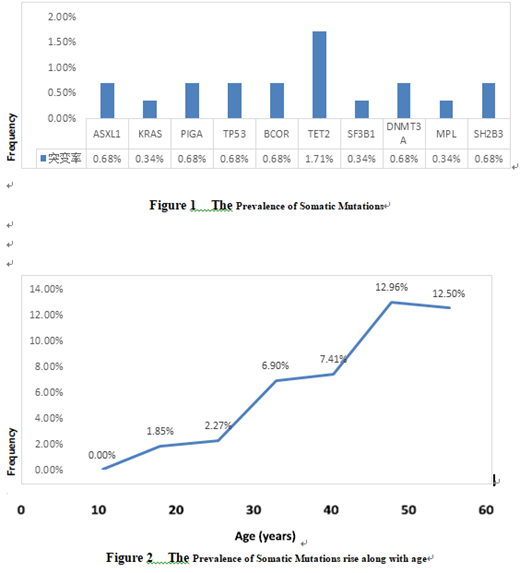ABSTRACT
Objectives and Methods:
It was postulated that the subset of aplastic anemia ( AA ) with somatic mutations typically seen in myeloid malignancies were at risk of clonal evolution[1,2]. But the response rate to immunosuppressive therapy (IST) was different or not between patients with or without mutations, remain unclear[1,2]. Age of patients with AA is a strong predictor of outcome for IST, and the presence of somatic mutations also rise appreciably in frequency with age[3]. Here we checked myeloid tumor-related somatic mutations from 293 children and adult patients who have acquired AA. We excluded Fanconi anemia, mutations of telomere maintenance, and a family history of BM failure (BMF) or cancer. We looked for somatic mutations by identifying previously characterized single-nucleotide variants in 25 genes that are recurrently mutated in myeloid malignancies in the peripheral blood cells by second-generation gene sequencing. And clinical significance of mutations in different ages was also annalyzed.
Results:
Somatic mutations in myeloid tumor-related genes are present in 6.48% of the patients. The the variants occurred in ten genes: ASXL1 (n = 2 ), KRAS (n = 1), PIGA (n = 2 ), TP53 (n = 2 ), BCOR (n = 2 ), TET2 (n = 5 ), SF3B1 (n = 1), DNMT3A (n = 2 ), SH2B3 (n = 1), MPL (n = 1) (Figure 1). The majority of the variants occurred in epigenetic genes: TET2, DNMT3A, ASXL1. Among patients of children and teen agers' group, adult group, the clonal mutations were observed in 2.82%, 9.93% (P= 0.013) (Figure 2). The presence of a somatic mutation was not associated with gender ( male or female, 3.87% vs 9.42%, P=0.054), severity ( non severe AA or severe AA, 7.87% vs 4.35%, P=0.233). Patients with somatic mutations had a simillar response rate, compared with patients without mutations in children and teen agers' group, or adult group. Somatic mutations in AA patients were not associated with high risk of transformation to MDS (P > 0.5 ).
Conclusions:
Age-related clonal hematopoiesis rise along age in patients with AA in chinese, but somatic mutations in AA patients were associated with efectiveness of IST, and risk of clonal evolution.
References
1 Kulasekararaj AG, Jiang J, Smith AE, et al. Somatic mutations identify a subgroup of aplastic anemia patients who progress to myelodysplastic syndrome. Blood. 2014; 124(17):2698-2704).
2 Yoshizato T, Dumitriu B, Hosokawa K et al. Somatic Mutations and Clonal Hematopoiesis in Aplastic Anemia. N Engl J Med. 2015 Jul 2; 373(1):35-47.
3 Jaiswal S, Fontanillas P, Flannick J, et al. Age-Related Clonal Hematopoiesis Associated with Adverse Outcomes. N Engl J Med 2014; 371:2488-98
No relevant conflicts of interest to declare.
Author notes
Asterisk with author names denotes non-ASH members.


